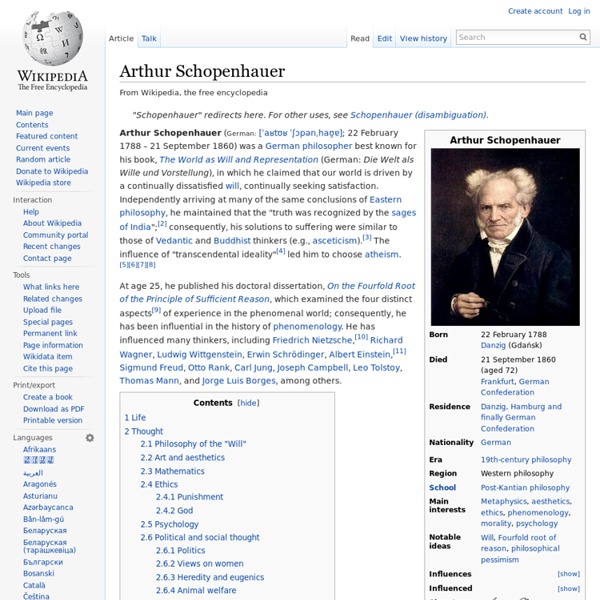Friedrich Nietzsche
Friedrich Wilhelm Nietzsche (/ˈniːtʃə/[1] or /ˈniːtʃi/;[2] German: [ˈfʁiːdʁɪç ˈvɪlhɛlm ˈniːt͡sʃə]; 15 October 1844 – 25 August 1900) was a German philosopher, cultural critic, poet, composer and Latin and Greek scholar. He wrote several critical texts on religion, morality, contemporary culture, philosophy and science, displaying a fondness for metaphor[3] and irony. Nietzsche's key ideas include perspectivism, the will to power, the death of God, the Übermensch and eternal recurrence. One of the key tenets of his philosophy is "life-affirmation", which embraces the realities of the world in which we live over the idea of a world beyond.
Golden ratio
Line segments in the golden ratio In mathematics, two quantities are in the golden ratio if their ratio is the same as the ratio of their sum to the larger of the two quantities. The figure on the right illustrates the geometric relationship.
Kant's Aesthetics and Teleology
First published Sat Jul 2, 2005; substantive revision Wed Feb 13, 2013 Kant's views on aesthetics and teleology are given their fullest presentation in his Critique of Judgment (Kritik der Urteilskraft, also translated Critique of the Power of Judgment), published in 1790. This work is in two parts, preceded by a long introduction in which Kant explains and defends the work's importance in his critical system overall: in the first part, the “Critique of Aesthetic Judgment,” Kant discusses aesthetic experience and judgment, in particular of the beautiful and the sublime, and also artistic creation; in the second part, the “Critique of Teleological Judgment,” he discusses the role of teleology (that is, appeal to ends, purposes or goals) in natural science and in our understanding of nature more generally. The Critique of Judgment has received less attention than the other two Critiques. 1. The Faculty of Judgment
Battle of Thermopylae
The Battle of Thermopylae (/θərˈmɒpɨliː/ thər-MOP-i-lee; Greek: Μάχη τῶν Θερμοπυλῶν, Machē tōn Thermopylōn) was fought between an alliance of Greek city-states, led by King Leonidas of Sparta, and the Persian Empire of Xerxes I over the course of three days, during the second Persian invasion of Greece. It took place simultaneously with the naval battle at Artemisium, in August or September 480 BC, at the narrow coastal pass of Thermopylae ('The Hot Gates'). The Persian invasion was a delayed response to the defeat of the first Persian invasion of Greece, which had been ended by the Athenian victory at the Battle of Marathon in 490 BC.
Kundalini
Kundalini Kundalini is a Sanskrit word meaning either "coiled up" or "coiling like a snake." There are a number of other translations of the term usually emphasizing a more serpent nature to the word - e.g. 'serpent power'. The caduceus symbol of coiling snakes is thought to be an ancient symbolic representation of Kundalini physiology.
Kantianism
Kantianism is the philosophy of Immanuel Kant, a German philosopher born in Königsberg, Prussia (now Kaliningrad, Russia). The term "Kantianism" or "Kantian" is sometimes also used to describe contemporary positions in philosophy of mind, epistemology, and ethics. Ethics[edit] Simply put, this criterion amounts to a thought experiment: to attempt to universalize the maxim (by imagining a world where all people necessarily acted in this way in the relevant circumstances) and then see if the maxim and its associated action would still be conceivable in such a world. For instance, holding the maxim kill anyone who annoys you and applying it universally would result in a world which would soon be devoid of people and without anyone left to kill. Thus holding this maxim is irrational as it ends up being impossible to hold it.
Ram Dass
Youth and education[edit] Richard Alpert was born to a Jewish family in Newton, Massachusetts. His father, George Alpert, was a lawyer in Boston.
Optimal Health, Nutrition, and Psychedelic Drugs
Good nutritional support is important if one is planning to undergo a psychedelic journey. A large part of my writing career, and two of my previous books, have been dedicated to reporting on health science, alternative medicine, medical breakthroughs, and increasing longevity. I think that maintaining optimal health is an absolute necessity if one is going to embark on psychedelic journeys throughout one’s life. Eating well, exercising, meditating, avoiding toxins, and taking a good blend of quality nutritional supplements is important for everyone’s health.
Søren Kierkegaard
Søren Aabye Kierkegaard (/ˈsɔrən ˈkɪərkəɡɑrd/ or /ˈkɪərkəɡɔr/; Danish: [ˈsɶːɐn ˈkiɐ̯ɡəɡɒːˀ] ( )) (5 May 1813 – 11 November 1855) was a Danish philosopher, theologian, poet, social critic, and religious author who is widely considered to be the first existentialist philosopher.[5] He wrote critical texts on organized religion, Christendom, morality, ethics, psychology and philosophy of religion, displaying a fondness for metaphor, irony and parables. Much of his philosophical work deals with the issues of how one lives as a "single individual", giving priority to concrete human reality over abstract thinking, and highlighting the importance of personal choice and commitment.[6] He was a fierce critic of idealist intellectuals and philosophers of his time, such as Swedenborg,[7] Hegel, Goethe, Fichte, Schelling, Schlegel, and Hans Christian Andersen. Early years (1813–1836)[edit]



